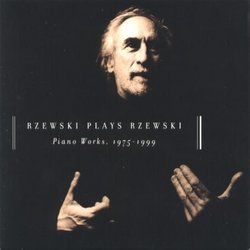Incredible playing of works with mixed content/concept
scarecrow | Chicago, Illinois United States | 11/17/2002
(5 out of 5 stars)
"Rzewski said he never developed a style or musical language,but if you work your way through all seven disks here there is actually a musical language which emerges and a static dimension as well to Rzewski's creativity.
His music demands a strong subject, an inflammatory one if possible to get his improvisatory creative imagination in gear, as his celebrated solidarity exhibited in the "36 Variations" on the "The People United Will Never Be Defeated" which to my ears still remains the high point of all these disks. His musical language is magnetized around simple contrasts,timbral virtuosity and variations on the music materials he selects, as even the "North American Ballads" suggest,which also maintains a fascination over the years.Equally if not more timbrally fascinating are his "Four Pieces" which are not here.Rzewski I beleive is a composer like Stravinsky, he needs something to manipulate that is already formed in the real world,very postmodern in orientation and his music then never claims a magical dimension where moments can synergize amongst/between itself,themselves, as exhibited by his political brethren as Christian Wolff or Luigi Nono. He does however utilize the entire 20th Century piano vocabulary, but is always drawn toward a what we can refer to as Rzewski-esque chromaticism, a dovetailing of the fifth semitone interval, as: c-e-f#-b-Bb-f,something you may find in the piano music of Karol Syzmanowski. The "Fantasia" opening here is a good example of this,played with great passion and might also suggest the harmonic meaderings of Busoni.Also the 26 miniature variations on "Mayn Yingele" had an interesting subject dedicated to the memory of Kristallnacht, the desecration of synagoges in Germany,the story of a Jewish man working 18 hour days who never sees his son, only sleeping.The musical form of "miniature" is quite interesting,and one Rzewski knows quite well.
He has impressive TV miniature Operas entitled "Chains".
These miniature variations are followed with a Cadenza prior to Variation # 23, a procedure he is fond of, a summing up with a virtuoso recapitulative display.He does similar handlings in his Cardew disk on "We Sing For the Future".There are some very low points I found in this piano music as the "Sonata" written in 1991, which has smatterings of glissandi Liberace like, and a stupid playfulness, that grows musically thin very quickly but is indeed disarming. The Agitato, the last movement begins with a low register uttering of "Taps".
Also the various four parts of "The Road", a work when complete will span some eight hours,all seemed arbitrary to me with the use of the voice to accentuate violent phrasings, and scouring the insides of the piano, with Cage-like tappings of the piano body.This wasn't exciting to say the least, and incredibly self-conscious.And I don't see what agenda is in place to transport the listener here to sustain such length.
Of course as I've mentioned Rzewski's creativity emanates from many places particulary the imagery of the Left, but was formed in his years with MEV the improvisatory ensemble in Rome,in the late Sixties, playing also with self-imposed American exiles, living on Fulbrights and Guggenheims. Rzewski for instance has been known to improvise cadenzas in his performances of Beethoven's "Hammerklavier Sonata", as well as in the early Sixties was the first to include the repertoire of the avant-garde of Stockhausen, Cage,Wolff and Boulez. Rzewski remains a unique example of radicalism in music with an affinity for the causes of the Left,but not so much as Cardew who was more an activist,founding a Marxist Party,nor not so academic bound as Christian Wolff,nor as deeply committed to European intellectual thought and high modernity,technology as Luigi Nono. But his music maintains an accessible directedness,with a high committment to lyricism.
His music also succeeds at times quite well in a dramatic situation as his 50 minute "Antigone-Legend", for Soprano Voice and Piano, or his chamber opera "The Invincible Persian Army"(1984)."

